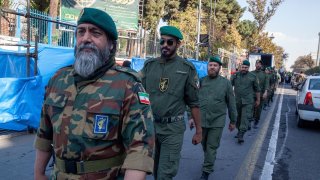Whether Kamala Harris or Donald Trump: Both Will Need to Get Tough on Iran
Without a robust and proactive strategy to confront Iranian ambitions, U.S. leadership will become little more than a chimera.
As Kamala Harris and Donald J. Trump vie for the presidency, they embody contrasting visions for America’s role on the world stage. Both candidates must define a pragmatic path for U.S. foreign policy amid rising global challenges.
Acting with hegemonic ambitions, Iran seeks to dominate the Middle East through force and intimidation. Yet its influence is not confined to that region. Where American resistance blocks its path, Iran has extended its reach into Africa, exploiting fragile regimes to establish footholds.
Here, the Iranian regime collaborates with two powerful allies: China and Russia.
These countries use Iran as a proxy, a “pace setter” in a larger geopolitical race, distracting the United States while they advance their own strategic goals.
In recent years, China has emerged as more than just an economic competitor to the United States—it is now a strategic threat. During a recent summit, President Xi Jinping hosted twenty-five African heads of state, where he announced a $51 billion support package aimed at strengthening China’s ties with the continent. This move is part of a broader strategy by Beijing to build partnerships across the Global South, positioning itself as an indispensable economic partner for developing nations. China’s expanding influence in Africa through massive infrastructure investments, economic support, and trade deals demonstrates its ability to win over governments and populations that have traditionally relied on Western aid. These actions go beyond economic interests; they have deep political and strategic motives.
Russia’s influence in Africa presents an equally significant threat, particularly in Sudan, where General Abdel Fattah al-Burhan, the chief of the Sudanese army, has developed a close relationship with the Russian military. Russia, through its Wagner Group mercenaries, has provided support to the Sudanese military in exchange for access to Sudan’s natural resources, including gold. This partnership is part of a broader Russian strategy to expand its influence in Africa by backing military regimes and exploiting weak states for economic and strategic gain.
Then, the Iranian regime, through its proxy Hezbollah, has actively expanded its presence across Africa, creating potential threats to Western personnel and interests as part of a strategy of horizontal escalation. While Iran’s focus remains largely on the Middle East, its financial networks in Africa, backed by Hezbollah’s extensive involvement in illicit activities such as money laundering, smuggling, and fundraising from the Lebanese diaspora, position it as a latent threat.
Hezbollah’s foothold in countries like Guinea, Sierra Leone, and the Democratic Republic of Congo provides Iran with the financial resources to disrupt U.S. interests in Africa. In the event of future tensions, Tehran could leverage these assets to escalate conflicts by targeting Western interests on the continent.
Recently, the Islamic Revolutionary Guard Corps (IRGC) formed a close relationship with General Al-Burhan, the Chief of Sudan’s army. The IRGC is working to establish a naval base in Port Sudan and providing Sudanese forces with drones and advanced military equipment. This support positions Sudan as a possible new base of operations for Iran against Israel.
Iran’s strategy of embedding itself within weak or unstable nations like Sudan is a clear attempt to replicate its proxy network in Africa and the Middle East, expand its reach, and create new fronts in its global campaign against the West.
The IRGC’s activities are not confined to proxy warfare. The organization has been implicated in numerous assassinations of Iranian dissidents abroad. For example, the IRGC was reportedly involved in the 2020 abduction and execution of Iranian journalist Ruhollah Zam. This extraterritorial violence demonstrates Iran’s willingness to target its opponents globally. The IRGC is also linked to terrorist attacks worldwide, including the 1994 bombing of the AMIA Jewish Community Center in Buenos Aires, which killed eighty-five people.
Iran’s involvement in global terrorism is a deliberate strategy to undermine U.S. and allied interests. The United States must take immediate action to counter this alliance before it becomes a larger, more entrenched threat. In a recent and significant move, The U.S. Department of Justice has charged six Hamas leaders, including Yahya Sinwar and Khaled Meshaal, with terrorism-related crimes. This action sets a precedent for holding terrorist organizations accountable.
The next president should continue this by targeting IRGC leaders involved in terrorism and assassinations. Holding these individuals accountable in U.S. courts would send a powerful message to Iran that its actions will not go unpunished. Furthermore, the next U.S. Congress should consider passing legislation to sanction groups that support Hamas and the IRGC, including their leaders and families. This would involve freezing their assets, blocking their financial access, and banning their travel to the United States. Such measures would significantly hinder the operations of these organizations and their enablers.
Without a robust and proactive strategy, U.S. leadership will become little more than a chimera as China and Russia continue to strengthen their footholds.
As Kamala Harris and Donald Trump compete for the presidency, they must urgently formulate strategies to confront these global threats. By strengthening political and economic alliances with its allies and partners, holding terrorist leaders accountable, and enacting comprehensive sanctions, the next administration can protect U.S. interests and maintain its leadership in an increasingly complex world.
Ahmed Charai is the Publisher of the Jerusalem Strategic Tribune and serves on the boards of directors of the Atlantic Council, the International Crisis Group, the Center for Strategic and International Studies, the Foreign Policy Research Institute, and the Center for the National Interest.
Image: Saadiex / Shutterstock.com.

